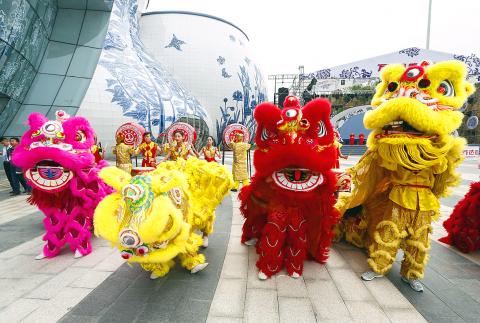China’s largest private property developer, the Wanda Group (萬達集團), yesterday opened an entertainment complex that it is positioning as a distinctly homegrown rival to Disney and its US$5.5 billion Shanghai theme park opening next month.
Wanda executives unveiled their US$3 billion “Wanda City” in Jiangxi Province’s capital, Nanchang, to thundering music reminiscent of the Pirates of the Caribbean theme and hailed the center as a representative of Chinese entertainment culture in the face of encroaching foreign influences.
Wanda’s massive site includes an US$800 million China-themed park filled with twirling “porcelain teacup” rides and bamboo forests, an indoor shopping mall with movie theaters, restaurants, hotels and the world’s largest ocean park.

Photo: EPA
Disney is set to open its own resort in Shanghai — the largest Disneyland in the world — next month.
As a leading player in Chinese firms’ globalization push, the property group has invested heavily in the film and cinema business and has spoken openly about its nationalistic mission to fend off Disney in the Chinese market and become an entertainment brand recognized around the world.
In remarks at the opening, Wang Jianlin (王健林), Wanda chairman and China’s richest man, did not mention Disney by name, but said Chinese people “fawned” over Western imports.
“Chinese culture led the world for 2,000 years, but since the past 300 years, because of our lagging development and the invasion of foreign cultures, we have more or less lacked confidence in our own culture,” Wang said. “We want to be a model for Chinese private enterprise and we want to establish a global brand for Chinese firms.”
Earlier this month, he told Chinese state television in an interview that Disney’s foray into China would crumble under more competitive pricing from his group and warned that the “the frenzy of Mickey Mouse and Donald Duck and the era of blindly following them has passed.”
Wanda’s dealmaking has been similarly aggressive as it quickly diversifies away from China’s weakening real-estate market.
The group purchased US-based AMC Theaters movie theater chain in 2012 for US$2.5 billion and paid US$3.5 billion for Legendary Entertainment — the Hollywood studio behind the Batman franchise — earlier this year as it ramped up its international push.
Seeking to capitalize on China’s rising middle class, developers are planning dozens of Chinese theme parks, along with projects from US firms like Universal Studios, DreamWorks and Six Flags.
However, instead of seeking to capture China’s top tier cities like Beijing or Shanghai, Wanda has built parks in smaller, but still massive cities like Wuhan, where it regularly presents the The Han Show — a Cirque du Soleil-style acrobatic performance that is based on the traditional culture of the Han, China’s largest ethnic group.
Even so, there were signs of Disney’s presence in Wanda City. Tourists who opted against paying 198 yuan (US$30) for the theme park and headed for the shopping mall were greeted by what looked like a woman in a Snow White costume as well as storm troopers, the armored soldiers from the Star Wars franchise owned by Disney.
A Uniqlo store was fully stocked with Disney merchandise and sold stacks of Mickey Mouse T-shirts for about US$12 each.
In response to a question about the presence of Disney characters, Wanda said in a statement that the company “does not control the promotional activities of retailers.”

To many, Tatu City on the outskirts of Nairobi looks like a success. The first city entirely built by a private company to be operational in east Africa, with about 25,000 people living and working there, it accounts for about two-thirds of all foreign investment in Kenya. Its low-tax status has attracted more than 100 businesses including Heineken, coffee brand Dormans, and the biggest call-center and cold-chain transport firms in the region. However, to some local politicians, Tatu City has looked more like a target for extortion. A parade of governors have demanded land worth millions of dollars in exchange

An Indonesian animated movie is smashing regional box office records and could be set for wider success as it prepares to open beyond the Southeast Asian archipelago’s silver screens. Jumbo — a film based on the adventures of main character, Don, a large orphaned Indonesian boy facing bullying at school — last month became the highest-grossing Southeast Asian animated film, raking in more than US$8 million. Released at the end of March to coincide with the Eid holidays after the Islamic fasting month of Ramadan, the movie has hit 8 million ticket sales, the third-highest in Indonesian cinema history, Film

Taiwan Semiconductor Manufacturing Co’s (TSMC, 台積電) revenue jumped 48 percent last month, underscoring how electronics firms scrambled to acquire essential components before global tariffs took effect. The main chipmaker for Apple Inc and Nvidia Corp reported monthly sales of NT$349.6 billion (US$11.6 billion). That compares with the average analysts’ estimate for a 38 percent rise in second-quarter revenue. US President Donald Trump’s trade war is prompting economists to retool GDP forecasts worldwide, casting doubt over the outlook for everything from iPhone demand to computing and datacenter construction. However, TSMC — a barometer for global tech spending given its central role in the

Alchip Technologies Ltd (世芯), an application-specific integrated circuit (ASIC) designer specializing in server chips, expects revenue to decline this year due to sagging demand for 5-nanometer artificial intelligence (AI) chips from a North America-based major customer, a company executive said yesterday. That would be the first contraction in revenue for Alchip as it has been enjoying strong revenue growth over the past few years, benefiting from cloud-service providers’ moves to reduce dependence on Nvidia Corp’s expensive AI chips by building their own AI accelerator by outsourcing chip design. The 5-nanometer chip was supposed to be a new growth engine as the lifecycle